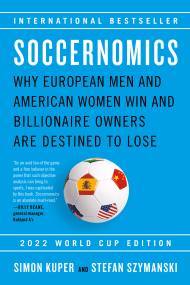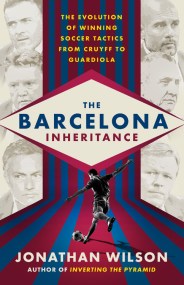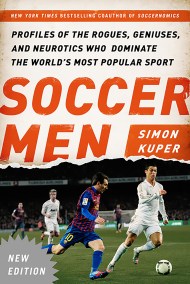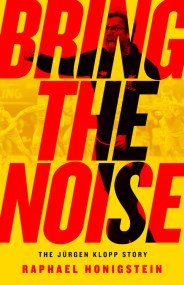7 Books About Soccer’s Greatest Coaches, Players and Teams
Ahead of the biggest matches of the year, get a kick out of these books that are sure to bring you the nitty gritty details about the greatest coaches, players, tactics and teams to ever grace the pitch.
Why doesn’t the United States dominate soccer internationally? And how can it? Which is the best soccer nation on Earth? Who has the most passionate fans? What impact does soccer have on suicide rates? Which sport will dominate the Earth—NFL or the English Premier League? Why are the people who run soccer clubs so dumb? These are some of the questions every soccer fanatic has asked themselves. Soccernomics answers them all.
Women’s soccer has come a long way. The first organized games on record — which took place three hundred years ago in the Scottish Highlands — were exhibition matches, where single women played against married women while available men looked on, seeking a potential mate. Today, champions like Mia Hamm, Abby Wambach, Brazil’s Marta and China’s Sun Wen, have inspired girls around the world to pick up the beautiful game for love of the sport. Inevitably, given the hardships and discrimination they face, women who play soccer professionally are so much more than elite athletes. They are survivors, campaigners, political advocates, feminists, LGBTQ activists, working moms, staunch opponents of racial discrimination and inspirational role models for many.
Barcelona’s style of play — pressing and possessing — is the single biggest influence on modern soccer. In The Barcelona Inheritance, Jonathan Wilson reveals how and why this came to pass, offering a deep analysis of the evolution of soccer tactics and style. In the late 1990s, Johan Cruyff’s Dream Team was disintegrating and the revolutionary manager had departed, but his style gave birth to a new generation of thinkers, including Pep Guardiola and Joséourinho. Today, their teams are first and second in the Premier League, marking the latest installment in a rivalry that can be traced back twenty-five years.
Lionel Messi, Diego Maradona, Alfredo Di St’fano: in every generation Argentina has uncovered a uniquely brilliant soccer talent. Perhaps it’s because the country lives and breathes the game, its theories, and its myths. Argentina’s rich, volatile history — by turns sublime and ruthlessly pragmatic — is mirrored in the style and swagger of its national and club sides. In Angels with Dirty Faces, Jonathan Wilson chronicles the operatic drama of Argentinian soccer: the appropriation of the British game, the golden age of la nuestra, the exuberant style of playing that developed as Juan Peróed the country, a hardening into the brutal methods of anti-fú, the fusion of beauty and efficacy under C’sar Luis Menotti, and the emergence of all-time greats.
Soccer Men goes behind the scenes with soccer’s greatest players and coaches. Inquiring into the genius and hubris of the modern game, Kuper details the lives of giants such as Arsè Wenger, Jose Mourinho, Jorge Valdano, Lionel Messi, Kakáand Didier Drogba, describing their upbringings, the soccer cultures they grew up in, the way they play, and the baggage they bring to their relationships at work.
Jürgen Klopp’s coaching career began in the German second tier at the unfashionable club of FSV Mainz 05, whom he steered to the Bundesliga for the first time in forty-one years. In 2008, he joined Borussia Dortmund, where he achieved back-to-back league titles and took the club to the UEFA Champions League final. He left Germany for one of the England’s most challenging jobs: to manage Liverpool, a once-mighty club that had not managed sustained success since the 1980s. It was not a task for the fainthearted. Anfield, Liverpool’s home, is a temple to flamboyant attacking soccer powered by passion. In Klopp, Liverpool finally found a manager who embodied the essence of the club. Klopp is dynamic, expressive, restless, driven-he feels every move and play, every tactical shift, every contact on the field. His eyes betray a wild ecstasy and agony as his team thrives or falls. His game plan demands relentless commitment-the famous gegenpress-and he is one of the great personal motivators in all sport.
Soccer has never been apolitical. This is especially true for Israel and Palestine. The game played a direct role in shaping the politics of both countries, and the view from the stands or the pitch shines a light on key moments in the region’s volatile history. In More Noble Than War, Nicholas Blincoe weaves a dramatic narrative filled with driven players and coaches who are inspired as much by nationalism as a love of the game. Blincoe traces the history from the sport’s introduction through church leagues, he rising tensions after the creation of Israel, and the decades of violence, war, and hunger strikes that have decimated teams.






